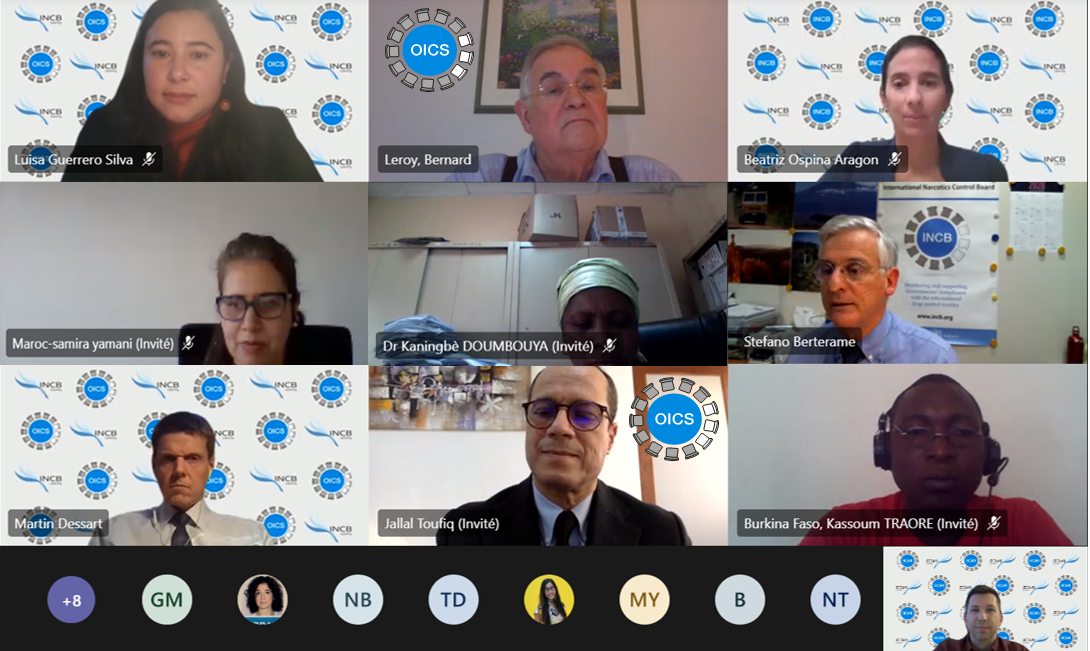
For information only - not an official document
UNIS/NAR/1426
8 December 2020
8 December 2020 International Narcotics Control Board Learning training benefits 10 countries of Francophone Africa
[scroll down for French version]
VIENNA, 8 December (United Nations Information Service) - Drug control officials from 10 African countries have joined an International Narcotics Control Board (INCB) training course this week which will help strengthen their compliance with the three international drug control conventions. Officials from Burkina Faso, Cameroon, Central African Republic, Democratic Republic of Congo, Gabon, Guinea, Morocco, Niger, Senegal and Togo are participating in an online capacity building training course.
Over nine sessions, government officials will have an opportunity to further enhance their monitoring and reporting capacity in the field of narcotic drugs, psychotropic substances and precursor chemicals, as well as in the use of the Board's International Import and Export Authorization System (I2ES). The tailored sessions are a follow-up to the regional training seminar held in Dakar, Senegal in September 2018.
In his opening remarks, INCB Board Member Jallal Toufiq highlighted the importance of cooperation and collaboration among competent national authorities and with INCB to ensure access to controlled substances for medical and scientific purposes while preventing diversion and abuse. The opening of the training was followed by a presentation on the international drug control framework conducted by INCB Board Member and Rapporteur Bernard Leroy focused on the consistent application of and legal obligations under the three international drug control conventions.

During 2020, 119 government officials from 22 countries and territories have benefited from INCB Learning virtual training activities. In line with the preventive measures related to the COVID-19 pandemic, INCB Learning is offering this third online regional capacity building activity as part of efforts to continue supporting Member States during the pandemic. Training sessions have been held in 2020 in French, English and Spanish. In March, INCB Learning e-modules became available in Spanish.
INCB Learning provides assistance to Member States in their efforts to ensure the appropriate availability of internationally controlled substances while preventing their abuse and diversion into illicit channels. The activities of INCB Learning have been made possible through the contributions of the Governments of Australia, Belgium, France, the Russian Federation, Thailand and the United States.
***
INCB is the independent, quasi-judicial body charged with promoting and monitoring Government compliance with the three international drug control conventions: the 1961 Single Convention on Narcotic Drugs, the 1971 Convention on Psychotropic Substances, and the 1988 Convention against Illicit Traffic in Narcotic Drugs and Psychotropic Substances. Established by the Single Convention on Narcotic Drugs of 1961, the thirteen members of the Board are elected in a personal capacity by the Economic and Social Council for terms of five years.
* *** *
For further information please contact:
INCB Secretariat
Telephone for media inquiries: (+43-1) 26060 4163
Email: incb.secretariat[at]un.org
Website:
www.incb.org
-------------------------------------------------------------------------------------
À l'intention des organes d'information • Document non officiel.
UNIS/NAR/1426
8 décembre 202
INCB Learning bénéficie à 10 pays d'Afrique francophone
VIENNE, 8 décembre (Service d'information des Nations Unies) - L'Organe international de contrôle des stupéfiants (OICS) a commencé cette semaine une activité de formation pour dont bénéficient 43 fonctionnaires en charge du contrôle des stupéfiants de 10 pays (Burkina Faso, Cameroun, République Centrafricaine, République démocratique du Congo, Gabon, Guinée, Maroc, Niger, Sénégal et Togo). Du 7 au 14 décembre 2020, les fonctionnaires participeront aux séances visant à renforcer la conformité de leurs autorités avec les trois conventions internationales relatives au contrôle des drogues.
Lors des neuf séances prévues, les fonctionnaires des gouvernements auront l'opportunité de renforcer leur capacité de suivi et de préparation des rapports statistiques pour les stupéfiants, les substances psychotropes et les précurseurs, ainsi que de l'utilisation du système international d'autorisation des importations et des exportations (I2ES) de l'organe. Ces séances sur mesure font suite au séminaire régional de formation, qui s'est tenu à Dakar, Sénégal, en septembre 2018.
Dans ses remarques préliminaires, Jallal Toufiq, membre de l'Organe, a surligné l'importance de la coopération et de la collaboration des autorités nationales compétentes avec l'OICS pour assurer l'accès aux substances contrôlées à des fins médicales et scientifiques tout en prévenant leur détournement et leur mésusage. L'ouverture de la formation a été suivi par une présentation du cadre international de contrôle des stupéfiants par Bernard Leroy, membre de l'Organe et rapporteur. La présentation s'est concentrée sur l'application uniforme et les obligations juridiques en vertu des trois conventions internationales relatives au contrôle des drogues.

En 2020, 119 fonctionnaires des gouvernements de 22 pays et territoires ont bénéficié des activités virtuelles de formation d'INCB Learning. Conformément aux mesures préventives liées à la pandémie au COVID-19, INCB Learning a offert cette troisième activité de renforcement des capacités régionales en ligne dans le cadre des efforts pour continuer de soutenir les États membres pendant la pandémie. Des séances de formation ont eu lieu en 2020 en français, anglais et espagnol. En mars, les modules d'apprentissage en ligne de l'OICS ont été rendu disponible en espagnol.
INCB Learning fournit une assistance aux États membres dans leurs efforts pour assurer une disponibilité appropriée de substances placées sous contrôle international tout en prévenant leur abus et leur détournement vers des réseaux illicites. Les activités d'apprentissage de l'OICS ont été rendues possible grâce aux contributions des gouvernements de l'Australie, Belgique, France, Fédération de Russie, Thaïlande et des États-Unis.
* *** *